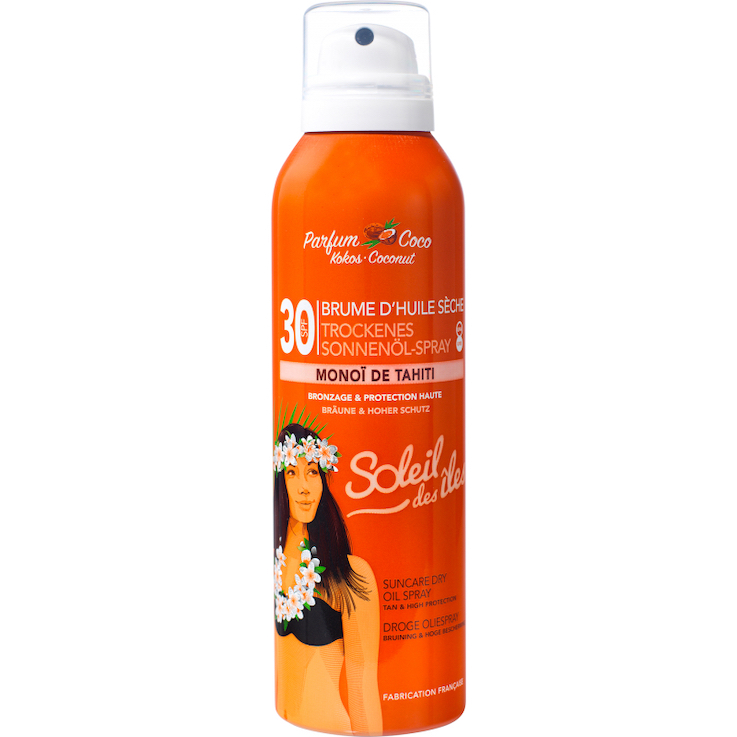€10.70*
Available, delivery time: 1-3 days
Product information "Tanning oil sun spray Monoi de Tahiti coconut SPF 30"
What makes the tanning oil sun spray with SPF 30 an ideal product for lovers of a carefree tan?
This tanning oil sun spray with genuine Monoï de Tahiti and high-quality sun filters is ideal for anyone looking for a natural and carefree tan. It moisturises, protects the skin from UVA and UVB rays and leaves no greasy film. The ultra-light texture is absorbed immediately without leaving traces or a greasy and sticky film for a dry-touch effect. The pleasant scent of coconut provides an exotic experience. With SPF 30, the spray offers a high level of sun protection and is waterproof. It is suitable for all skin types and is perfect for sunny days. However, follow the application instructions to protect the skin as well as possible. Its aerosol spray makes it possible to reach hard-to-reach areas of the body such as the back of the legs.
The benefits of sun protection tanning oil SPF 30:
- Combines tanning and sun protection
- Contains Monoï de Tahiti Appellation d'Origine (controlled designation of origin)
- Intensively moisturises the skin
- Has an ultra-light texture that is neither greasy nor sticky (gives a dry feeling)
- Leaves no residue
- Waterproof
- Provides high sun protection with SPF 30
Sun protection factor and protection mechanism
Composition and texture
Feeling of application and comfort
Tanning effect
Reflection and absorption
Psychological and practical aspects
Summary
Overall, it can be said that with the same SPF, the speed of tanning theoretically does not depend on the type of sunscreen, but on the amount of UV rays absorbed. In practice, however, the texture and application properties of sun oils could promote faster and more even tanning and therefore count as tanning accelerators. However, it is important to note that both products should provide the same level of protection against harmful UV rays, provided they are applied correctly.
However, it remains crucial that, regardless of the product used, sun protection is regularly renewed and additional protective measures, such as wearing protective clothing and avoiding the most intense hours of sunshine, are adhered to. This is the only way to achieve a healthy tan without an increased risk of skin damage.
How is Monoi de Tahiti tanning oil - dry sun oil SPF 30 used?
- Shake the spray well before use and apply the tanning oil generously to the body before exposing yourself to the sun.
- Frequent reapplication is important to maintain protection.
- This tanning oil offers medium to high sun protection with SPF 30 and is therefore suitable for medium to dark skin types with intensive sun exposure.
What should I bear in mind when sunbathing?
- Protect your skin before sunbathing. Protection from UV radiation is not immediate
- To avoid sunburn, always use products that suit your specific skin type.
- Remember that overexposure to the sun can be harmful to your health.
- Always keep babies and young children away from direct sunlight.
- Avoid being exposed to direct sunlight between 12 noon and 4 pm, as the radiation is most intense at this time.
- Slow natural tanning without damaging the skin will also help you keep your tan for longer.
What ingredients does Monoi de Tahiti tanning oil - dry sun oil SPF 30 contain?
Warnings:



